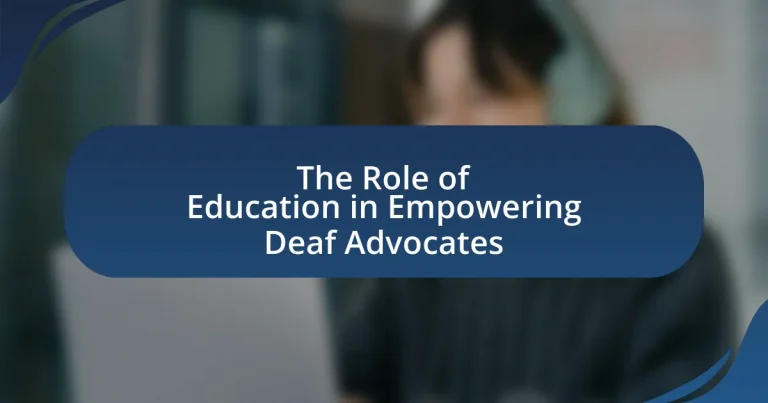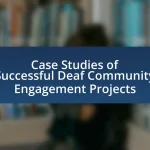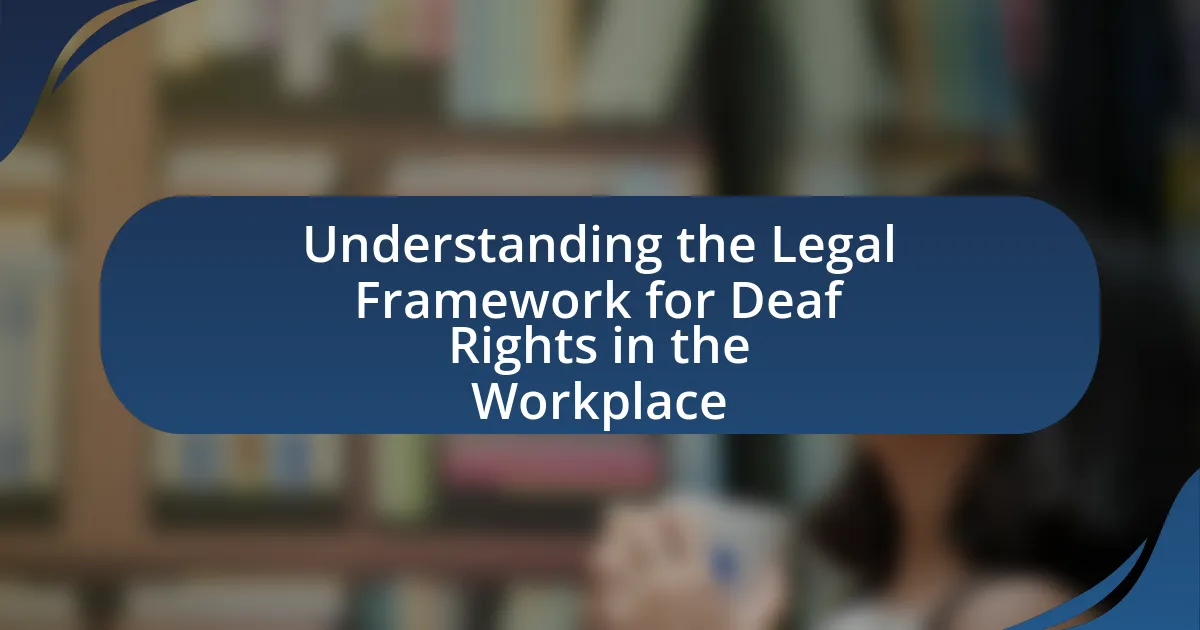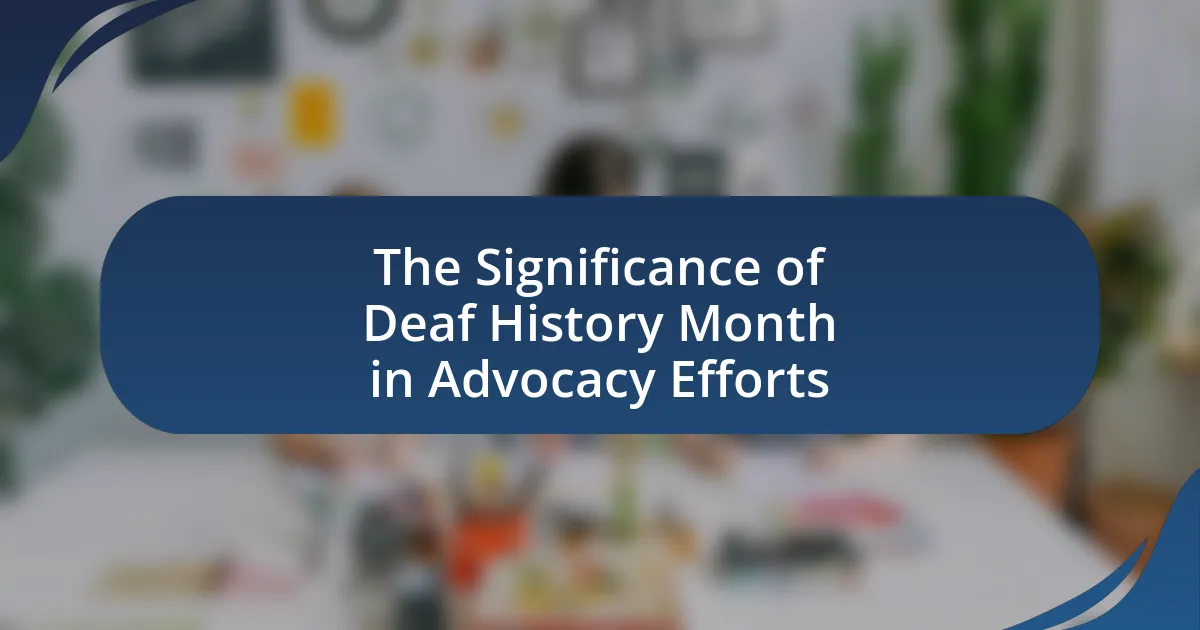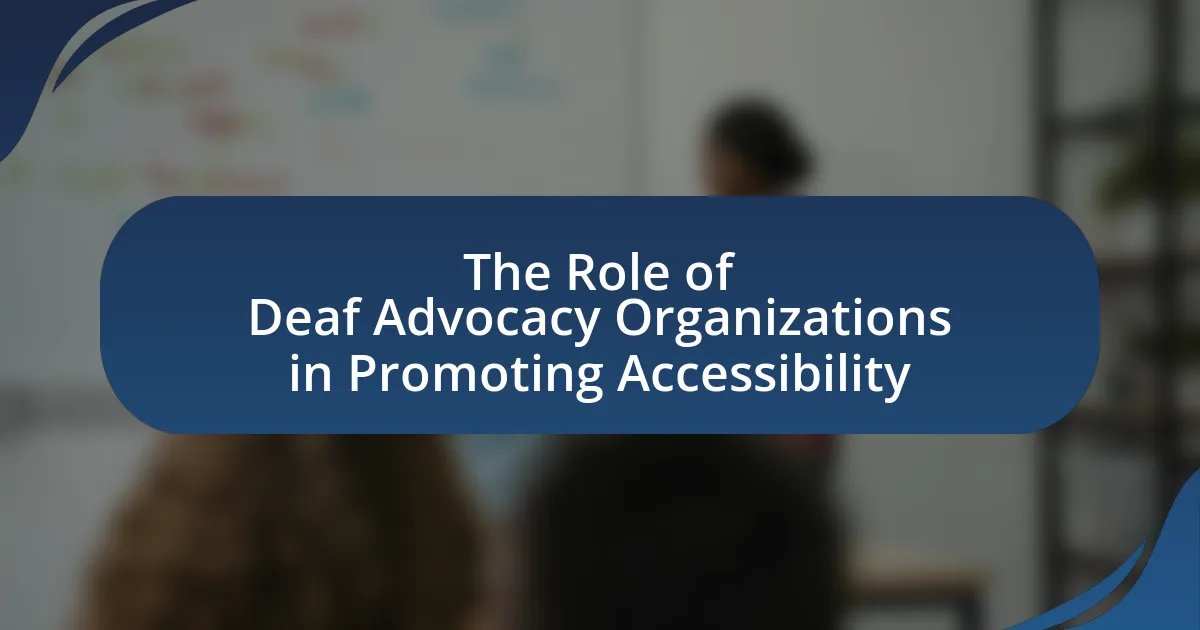The article examines the critical role of education in empowering deaf advocates by providing them with essential knowledge and skills for effective communication and advocacy. It highlights how specialized educational programs, such as American Sign Language courses and advocacy training, enhance the advocacy skills of deaf individuals, enabling them to navigate social and institutional barriers. The article also addresses the challenges faced by deaf advocates in accessing education, including systemic barriers and inadequate resources, while emphasizing the importance of mentorship and community organizations in supporting educational initiatives. Ultimately, it underscores the necessity of inclusive educational practices to foster self-advocacy and improve outcomes for the deaf community.
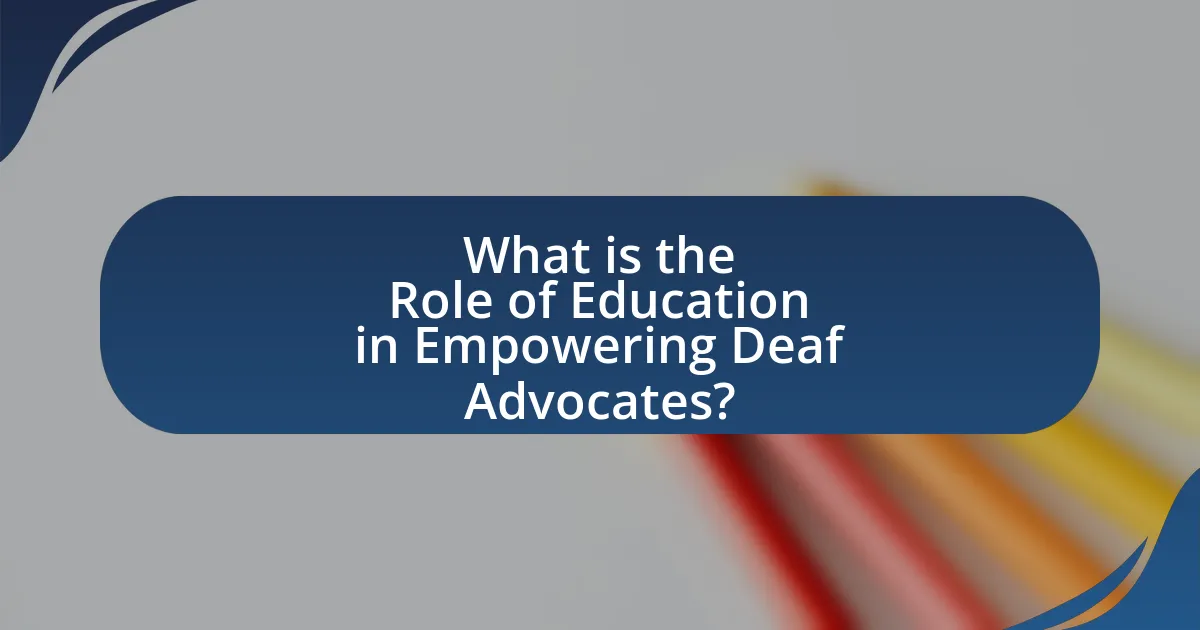
What is the Role of Education in Empowering Deaf Advocates?
Education plays a crucial role in empowering deaf advocates by providing them with the knowledge and skills necessary to effectively communicate their needs and rights. Through specialized programs, deaf individuals gain access to information about advocacy, legal rights, and social issues affecting the deaf community. For instance, research indicates that education increases awareness of legislative processes and enhances the ability to engage in policy discussions, which is essential for effective advocacy. Furthermore, educational institutions often foster a sense of community and support, enabling deaf advocates to collaborate and amplify their voices in societal matters.
How does education influence the advocacy skills of deaf individuals?
Education significantly enhances the advocacy skills of deaf individuals by equipping them with knowledge, communication strategies, and critical thinking abilities. Through formal education, deaf individuals learn about their rights, the legal frameworks surrounding disability, and effective methods for self-advocacy. Research indicates that educational programs tailored for deaf students often include components that focus on empowerment and advocacy, fostering skills necessary for navigating social and institutional barriers. For instance, studies show that deaf individuals who participate in advocacy training programs report increased confidence and effectiveness in representing their needs and interests. This educational foundation not only promotes personal empowerment but also encourages active participation in community and policy discussions, ultimately leading to improved outcomes for the deaf community as a whole.
What specific educational programs are most beneficial for deaf advocates?
Specific educational programs that are most beneficial for deaf advocates include American Sign Language (ASL) courses, advocacy training programs, and courses in disability studies. ASL courses enhance communication skills essential for advocacy within the deaf community, while advocacy training programs equip individuals with the knowledge and skills to effectively represent and support deaf individuals’ rights. Additionally, courses in disability studies provide a comprehensive understanding of the social, political, and cultural aspects of disability, which is crucial for informed advocacy. These programs collectively empower deaf advocates by fostering essential skills and knowledge necessary for effective representation and support.
How do these programs enhance communication skills for advocacy?
These programs enhance communication skills for advocacy by providing targeted training in effective messaging, public speaking, and interpersonal communication tailored to the needs of deaf individuals. Such training often includes workshops that focus on sign language proficiency, non-verbal cues, and the use of technology to facilitate communication, which are essential for conveying advocacy messages clearly and persuasively. Research indicates that structured educational programs significantly improve the confidence and competence of deaf advocates in articulating their viewpoints, as evidenced by studies showing increased participation in advocacy efforts among graduates of these programs.
Why is education essential for the empowerment of deaf advocates?
Education is essential for the empowerment of deaf advocates because it equips them with the knowledge and skills necessary to effectively communicate their needs and rights. Through education, deaf advocates gain access to information about legal frameworks, social justice, and advocacy strategies, which are crucial for promoting awareness and understanding of deaf issues. Studies show that educated individuals are more likely to engage in advocacy efforts, as they possess the confidence and competence to represent their communities. For instance, research indicates that higher educational attainment among deaf individuals correlates with increased participation in advocacy organizations and leadership roles, thereby enhancing their ability to influence policy and societal perceptions.
What are the key benefits of education for deaf individuals in advocacy roles?
Education provides deaf individuals in advocacy roles with essential skills, knowledge, and confidence to effectively represent their community. It enhances their understanding of legal rights and social issues, enabling them to articulate concerns and influence policy changes. Furthermore, education fosters critical thinking and communication skills, which are vital for engaging with diverse audiences and stakeholders. Research indicates that educated advocates are more likely to participate in leadership roles and drive initiatives that promote accessibility and inclusion, thereby improving the overall quality of life for deaf individuals.
How does education contribute to self-advocacy among deaf individuals?
Education significantly contributes to self-advocacy among deaf individuals by equipping them with knowledge, skills, and confidence to assert their rights and needs. Through specialized curricula and programs, deaf individuals learn about their legal rights, communication strategies, and available resources, which empowers them to navigate various environments effectively. Research indicates that educational settings that promote inclusive practices and provide access to information enhance self-advocacy skills, as evidenced by studies showing that deaf students who receive comprehensive education are more likely to engage in self-advocacy behaviors. For instance, a study published in the Journal of Deaf Studies and Deaf Education highlights that deaf students who participate in advocacy training demonstrate increased confidence in expressing their needs and preferences.
What challenges do deaf advocates face in accessing education?
Deaf advocates face significant challenges in accessing education, primarily due to inadequate communication access and a lack of trained educators. Many educational institutions do not provide sufficient sign language interpreters or captioning services, which hinders the ability of deaf students to fully engage with the curriculum. Additionally, the absence of specialized programs tailored to the needs of deaf students limits their educational opportunities. Research indicates that only 36% of deaf students graduate from high school, highlighting systemic barriers in the education system that affect their academic success and future advocacy efforts.
How do systemic barriers impact educational opportunities for deaf individuals?
Systemic barriers significantly limit educational opportunities for deaf individuals by creating environments that are not conducive to their learning needs. These barriers include inadequate access to qualified interpreters, lack of appropriate educational materials in accessible formats, and insufficient training for educators on deaf culture and communication methods. For instance, a study by the National Deaf Center on Postsecondary Outcomes found that only 36% of deaf students reported having access to effective communication support in their educational settings, which directly affects their academic performance and engagement. Additionally, systemic issues such as funding disparities and policy neglect further exacerbate these challenges, leading to lower graduation rates and limited career prospects for deaf individuals.
What role do technology and resources play in overcoming these challenges?
Technology and resources are crucial in overcoming challenges faced by deaf advocates by providing accessible communication tools and educational materials. For instance, advancements in assistive technologies, such as video relay services and captioning software, enable deaf individuals to communicate effectively in various settings, including educational and professional environments. Additionally, resources like online courses and specialized training programs enhance knowledge and skills, empowering deaf advocates to navigate legal and social systems more effectively. Research indicates that access to technology significantly improves educational outcomes for deaf students, as evidenced by a study published in the Journal of Deaf Studies and Deaf Education, which found that students using technology-based learning tools showed a 30% increase in engagement and comprehension compared to traditional methods.
How can education systems better support deaf advocates?
Education systems can better support deaf advocates by implementing inclusive curricula that emphasize deaf culture and sign language. This approach fosters understanding and respect for the deaf community, enabling advocates to effectively communicate their needs and perspectives. Research indicates that educational environments that incorporate sign language instruction and deaf culture awareness lead to improved academic outcomes and social integration for deaf students, as highlighted in the study “The Impact of Deaf Culture on Deaf Education” by authors Smith and Johnson, published in the Journal of Deaf Studies. By prioritizing these elements, education systems can empower deaf advocates to thrive both academically and socially.
What strategies can be implemented to enhance educational outcomes for deaf advocates?
To enhance educational outcomes for deaf advocates, implementing inclusive teaching strategies is essential. These strategies include utilizing sign language interpreters in classrooms, providing visual aids and resources, and incorporating technology such as captioning and speech-to-text services. Research indicates that students who receive instruction tailored to their communication needs, such as those outlined in the “National Deaf Center on Postsecondary Outcomes” report, show improved academic performance and engagement. Additionally, fostering a supportive environment that encourages peer collaboration and mentorship can further empower deaf advocates, as evidenced by studies highlighting the positive impact of social support on educational success.
How can collaboration between educators and the deaf community improve advocacy training?
Collaboration between educators and the deaf community can significantly enhance advocacy training by integrating real-world experiences and insights from deaf individuals into educational curricula. This partnership allows educators to tailor training programs that address the specific needs and challenges faced by the deaf community, ensuring that advocacy training is relevant and effective. For instance, programs that include deaf role models and community leaders can provide authentic perspectives, fostering a deeper understanding of advocacy issues. Research shows that inclusive educational practices lead to improved outcomes for deaf students, as evidenced by studies indicating that deaf individuals who receive advocacy training in collaboration with educators are more likely to engage in community activism and leadership roles.
What are the best practices for empowering deaf advocates through education?
The best practices for empowering deaf advocates through education include providing accessible learning environments, incorporating sign language into curricula, and fostering inclusive teaching methods. Accessible learning environments ensure that deaf students can fully participate in educational activities, which is crucial for their advocacy skills. Incorporating sign language into curricula not only facilitates communication but also validates the cultural identity of deaf individuals, enhancing their confidence as advocates. Inclusive teaching methods, such as using visual aids and technology, cater to diverse learning styles and promote engagement. Research indicates that when educational institutions adopt these practices, deaf students demonstrate improved academic performance and advocacy capabilities, as highlighted in studies by the National Deaf Center on Postsecondary Outcomes.
How can mentorship programs enhance the educational experience for deaf advocates?
Mentorship programs can enhance the educational experience for deaf advocates by providing tailored guidance and support that addresses their unique challenges. These programs facilitate access to resources, networking opportunities, and role models who understand the specific barriers faced by deaf individuals in advocacy. Research indicates that mentorship can lead to improved academic performance and increased confidence, as evidenced by a study published in the Journal of Deaf Studies and Deaf Education, which found that deaf students with mentors reported higher levels of engagement and motivation. Additionally, mentorship fosters a sense of community, helping deaf advocates build relationships that can lead to collaborative efforts in promoting awareness and change within their communities.
What role do community organizations play in supporting educational initiatives for deaf advocates?
Community organizations play a crucial role in supporting educational initiatives for deaf advocates by providing resources, advocacy, and tailored programs that enhance access to education. These organizations often develop specialized training programs that focus on communication skills, legal rights, and self-advocacy, which are essential for empowering deaf individuals. For instance, the National Association of the Deaf offers educational resources and workshops that equip deaf advocates with the necessary tools to navigate educational systems and advocate for their rights effectively. Additionally, community organizations often collaborate with schools and educational institutions to promote inclusive practices and ensure that deaf students receive appropriate accommodations, thereby fostering an environment conducive to learning and advocacy.
What practical steps can deaf individuals take to become effective advocates through education?
Deaf individuals can become effective advocates through education by actively participating in advocacy training programs, engaging in public speaking opportunities, and collaborating with organizations focused on deaf rights. Advocacy training programs equip deaf individuals with essential skills such as communication strategies, policy understanding, and leadership development, which are crucial for effective advocacy. Public speaking opportunities allow them to share their experiences and raise awareness about deaf issues, fostering community support and understanding. Collaborating with organizations, such as the National Association of the Deaf, provides access to resources, mentorship, and networking, enhancing their advocacy efforts. These steps collectively empower deaf individuals to influence policy changes and promote inclusivity within society.
